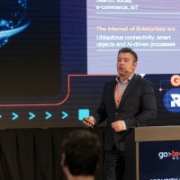

Stackify and Elastic Security are top competitors in the monitoring and security sector. Elastic Security often outshines in features, thanks to its advanced capabilities, but Stackify appeals with better pricing and support.
Features: Stackify is favored for its strong application performance monitoring, detailed diagnostics, and ease of use. Elastic Security is recognized for its broad threat detection, extensive analysis tools, and comprehensive security suite. Users highlight its superior security features and capacity for handling complex security needs.
Room for Improvement: Stackify could improve its integration capabilities, enhance data visualization, and extend its technical functionalities. Elastic Security might simplify its initial setup, improve dashboard customization, and streamline some user interactions to reduce complexity.
Ease of Deployment and Customer Service: Stackify has an easy deployment process and responsive customer service, appealing to smaller teams needing simplicity. Elastic Security can be more complex during deployment, but offers strong customer support which users appreciate during implementation.
Pricing and ROI: Stackify is praised for its competitive pricing and positive ROI, providing good value for its cost. Elastic Security, despite a higher price, offers considerable return through its advanced features, appealing to those needing extensive security solutions.
| Product | Market Share (%) |
|---|---|
| Elastic Security | 2.9% |
| Stackify | 0.4% |
| Other | 96.7% |


| Company Size | Count |
|---|---|
| Small Business | 40 |
| Midsize Enterprise | 11 |
| Large Enterprise | 15 |
| Company Size | Count |
|---|---|
| Small Business | 3 |
| Midsize Enterprise | 2 |
| Large Enterprise | 2 |
Elastic Security combines the features of a security information and event management (SIEM) system with endpoint protection, allowing organizations to detect, investigate, and respond to threats in real time. This unified approach helps reduce complexity and improve the efficiency of security operations.
Additional offerings and benefits:
Finally, Elastic Security benefits from a global community of users who contribute to its threat intelligence, helping to enhance its detection capabilities. This collaborative approach ensures that the solution remains on the cutting edge of cybersecurity, with up-to-date information on the latest threats and vulnerabilities.
Stackify is an application performance management (APM) solution that combines application performance monitoring with logs, errors, and reporting. It is a SaaS solution that is developer-focused. Users can quickly scan, identify, and repair issues with applications. Stackify APM offers valuable tools, such as Prefix and Retrace, which help to make it a comprehensive and valuable APM solution. Stackify is now part of the Netreo family of IT Infrastructure Management (ITIM), which is considered one of the fastest-growing IT organizations in the marketplace today.
Stackify Prefix
Stackify Prefix helps developers write better code, faster. The tool examines, tests, and approves code as it is being written. Almost every new application is code-perfect, negating the need for exhausting troubleshooting and frustrating time-consuming code review.
Prefix is able to discover poor-performing SQL queries, ORM queries, potential bottlenecks, and concealed exceptions prior to moving the application into production.
Prefix offers Summary Dashboards, intuitive suggestions, integrated logs, and distributed tracing. Distributed tracing expands visibility to cloud-native applications, microservices, and containers and can also provide additional transparency to cache services, web services, third-party services, and more. Users are able to easily move from logs to traces and back.
This valuable tool ensures developers are able to consistently release the best code possible in the least amount of time, while improving performance, productivity, and profitability.
Prefix is a very robust and easy-to-use tool. It can be used seamlessly with Linux, macOS, and Windows. Prefix integrates well with numerous languages, such as Java, Python, Ruby, PHP, Node.js, .Net, and .Net Core.
Stackify Retrace
Stackify Retrace is a user-friendly, trusted APM solution used in more than fifty countries worldwide. Users know that Retrace is able to ensure they can complete quicker, more efficient application development and consistently enhance overall application performance by suggesting important intuitive suggestions users need.
This solution is beneficial to both developers (Dev) and operations (Ops) personnel to learn to improve code and immediately finetune issues by:
Retrace Real User Monitoring (RUM) uses both front-end and back-end monitoring to give users a complete picture of what is going on with the applications. This intuitive dashboard displays performance with a complete breakdown of resource usage and integrates the server-side and client traces into one engaging, user-friendly, extensive view.
Retrace is an out-of-the-box solution that works seamlessly with Java stacks, PHP, Node.js, Ruby, Python, .Net, and .Net Core. It is also compatible with many of today’s popular frameworks, such as AWS, Azure, Elasticsearch, MongoDB, MySQL, Oracle, PostgreSQL, Redis, and SQL Server. Additionally, Retrace will work effectively with many cloud providers, containers, and languages, and offers excellent and easy integration with today's favorite tools such as Jira, Slack, Jenkins, and more.
We monitor all Log Management reviews to prevent fraudulent reviews and keep review quality high. We do not post reviews by company employees or direct competitors. We validate each review for authenticity via cross-reference with LinkedIn, and personal follow-up with the reviewer when necessary.